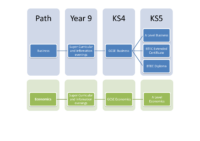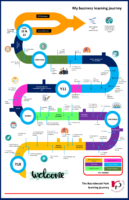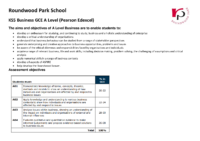Business & Economics
The study of business and economics has never been more relevant in our rapidly changing world.
Challenges to the global economy, the credit crunch, Brexit, environmental sustainability, business ethics and changes in the global power balance are issues that are rarely out of the news spotlight. Furthermore, our interest in entrepreneurship has never been higher, with television series such as ‘Dragon’s Den’ and ‘The Apprentice’ encouraging innovation and enterprise. The business and economics department offers a range of courses from GCSE, A Level and BTEC Nationals. The staff all have significant industry experience and strive to make all courses relevant and engaging for our students.
Key Stage 4 GCSE (Years 10 & 11)
Edexcel Business (1BSO)
Students will have the opportunity to study the following topics in preparation for two exam papers at the end of the course:
- Theme 1 (Paper 1, 1hr 45mins): Investigating small businesses: enterprise and entrepreneurship, business opportunities, business ideas into practice, effective businesses and external influences on businesses.
- Theme 2 (Paper 2, 1hr 45mins): Building a business: business growth, marketing, financial, operational and human resource decisions.
Key Stage 4 GCSE (Years 10 & 11)
AQA Economics
Students will have the opportunity to study the following units plus the chance to relate this theory to the real world:
- 3.1 How Markets Work (Micro, Year 10) – Supply & Demand, Elasticity, Revenue, Costs & Profits, How Resources are Allocated, Market Structure, Market Failure & Government Intervention
- 3.2 How the Economy Works (Macro, Year 11) – Government Objectives, Government Policies, International Economics & Financial Markets
At the end of the qualifications students will take two exams, both are 1hour 45mins; Paper 1 Covers Micro & Paper 2 covers Macro.
Key Stage 5 A Level (Years 12 & 13)
Pearson Edexcel Business (9BS0)
In Theme 1 students learn about dynamic markets, social media and online retailing, innovation and entrepreneurship. Theme 2 introduces business finance, the impact of economic uncertainty on businesses and the competitive environment.
In the second year of the course Theme 3 moves from functions to strategy, exploring business decision-making, small business survival, managing change and scenario planning. Finally, Theme 4 explores global business, investigating overseas markets, cultural and social differences and the impact of multinationals.
Assessment is through three examinations:
- Paper 1 has data response and essay questions and focuses on Theme 1 and Theme 4 content.
- Paper 2 has data response and essay questions and focuses on Theme 2 and Theme 3 content
- Paper 3 has a pre-released context and students will investigate an industry or market in which businesses operate before their exam. The data response and essay questions in the exam are linked to the context.
Key Stage 5 BTEC (Years 12 & 13)
Pearson Nationals in Business
There is a choice for students wanting to study the BTEC Business. They can either opt for the one A Level equivalent or the 2 A Level equivalent course. Depending on their choice they will study the following:
- Extended Certificate (4 units, equivalent to 1 A Level): Units: Exploring Business (Assignment Based), Developing a Marketing Campaign (Controlled Assessment) and Personal and Business Finance (Examination) and Recruitment and Selection Process (Assignment Based)
- Diploma (8 units, equivalent to 2 A Levels): Units as above plus: Principles of Management (Controlled Assessment), Managing an Event (Task and Assignment Based), International Business (Assignment Based) and pitching for a New Business (Assignment Based).
Assessment is through assignments, controlled assessments and examinations.
Key Stage 5 A Level (Years 12 & 13)
Edexcel Economics (9ECO)
Students will study the following themes:
- Theme 1: Introduction to markets and market failure
- Theme 2: The UK economy – performance and policies
- Theme 3: Business behaviour and the labour market
- Theme 4: A global perspective
There are three exam papers at the end of the second year. Paper 1 will assess microeconomics, drawn from themes 1 and 3, paper 2 will assess macroeconomics, drawn from themes 2 and 4, and paper 3 will assess the content from all 4 themes.
Key Stage 5 LIBF Certificate in Financial Studies (Enrichment Year 12 only)
London Institute of Financial Studies
This course is an enrichment option taken by many of our Sixth Form Students. It encourages them to become responsible borrowers and sensible savers, and to appreciate the need for financial planning throughout their life. It prepares them for further study by developing the core skills of critical analysis and evaluation, verbal communication (through classroom discussion) and written communication.
This greater understanding of financial planning can support entry to university on finance and banking courses and a wide range of other disciplines. It also supports progress to a wide range of entry level occupations within finance, ensuring that learners understand the sector and have a range of transferrable skills and knowledge.
Assessment is through four examinations covering two units. Two examinations are multiple choice and the other two extended response. CeFS consists of two mandatory units.
Further details can be found > HERE <










